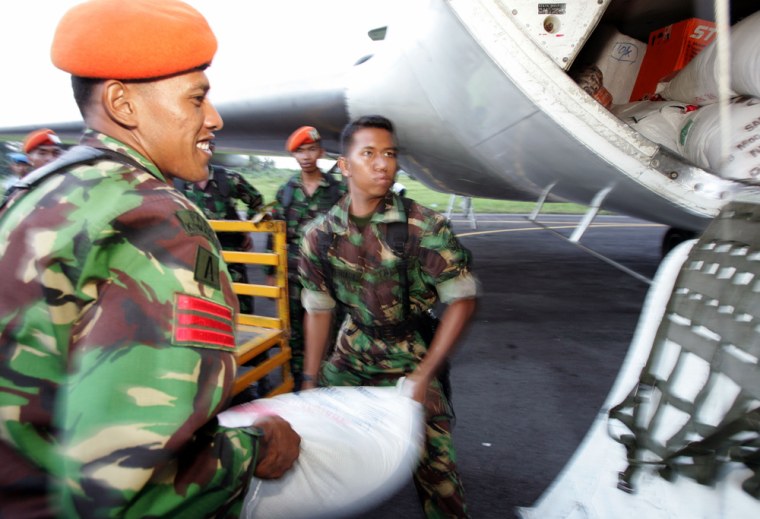Typhoid, diarrhea and hepatitis epidemics pose a grave threat to tens of thousands of people who survived a devastating tsunami which tore across the Indian Ocean on Sunday, international relief agencies said.
“The biggest threat to survivors is from the spread of infection through contamination of drinking water and putrefying bodies left by the receding waters,” Jamie McGoldrick of the U.N.'s Office for the Coordination of Humanitarian Affairs (OCHA) told reporters Monday.
“We’ve had reports already from the south of India of bodies rotting where they have fallen and that will immediately affect the water supply especially for the most impoverished people,” said Christian Aid emergency officer Dominic Nutt.
Epidemics feared
Aid agencies around the world have rushed staff, equipment and money to southern Asia. In New York, U.N. Emergency Relief Coordinator Jan Egeland warned there could be epidemics of intestinal and lung infections within days unless health systems in the eight stricken countries were enabled to cope.
"The drinking water for millions of people has been polluted," Egeland said at a press conference Monday.
U.N. officials said the organization faced an “unprecedented” challenge to get aid to victims from Sri Lanka to Indonesia, even taking lives as far away as Somalia.
'Rotting bodies'
In Geneva, spokeswoman Fadela Chaib of the World Health Organization (WHO) told Reuters that it was vital to get water purification tablets and anti-malarial first aid kits into the region, especially to the worst-hit countries.
“When clean water systems are destroyed, as they almost always are in disasters of this type, you have the immediate threat of water-borne diseases like diarrhea, typhoid and hepatitis-E,” she said.
Governments and humanitarian agencies around the globe pledged cash funds and dispatched emergency medical and rehabilitation teams to the region around the Bay of Bengal and down to Indonesia.
OCHA called an international meeting in Geneva for Tuesday to get a program together.
Yvette Stevens, top official in Geneva for OCHA, said it would allow countries wanting to contribute to hear what was needed from representatives of the affected nations — Sri Lanka, Thailand, Indonesia, India, the Maldives, Malaysia, Myanmar and Bangladesh.
Experts said the top five issues to be addressed were water, sanitation, food, shelter and health.
Some affected areas have had communications cut. Others are so remote it is impossible to know the extent of the damage.
“This is a massive humanitarian disaster and the communications are so bad we still don’t know the full scale of it. Unless we get aid quickly to the people many more could die,” said Phil Esmond, head of Oxfam in Sri Lanka.
U.S. pledges assistance
The United States on Monday pledged an initial $15 million in aid and dispatched disaster specialists to several of the countries hit by tsunamis. President Bush sent letters of condolence.
“This is indeed an international tragedy, and we are going to do everything we can,” Secretary of State Colin Powell said Monday.
American ambassadors have released $100,000 each to India, Indonesia, the Maldives and Sri Lanka, and Powell said $4 million would be given to the Red Cross.
“This is not just a one-time thing,” Powell said. “Some 20,000-plus lives have been lost in a few moments, but the lingering effects will be there for years — the damage that was caused. The rebuilding of schools and other facilities will take time.”
U.S. government specialists in disaster relief were sent to Thailand and Indonesia, and others will be spread out through the region.
Massive amounts of aid
In addition to the aid pledged by the U.S., offers of assistance have poured in from across the globe:
- Japan said Tuesday it will provide around $30 million in aid, and will send three navy vessels to waters off Thailand to help rescue survivors. An initial $4 million will be spent on medical supplies, power generators and temporary shelter for survivors.
- In Britain, three charities — Save the Children, World Vision and Christian Aid — were flying out teams to help workers already in Sri Lanka and India and sending money to the region.
- Australian Foreign Minister Alexander Downer pledged $7.7 million to international aid agencies.
- China was preparing to dispatch to Indonesia a team of more than 40 experts for relief and rescue work, the official Xinhua News Agency said.
- In Brussels, the 25-nation European Union’s executive Commission announced Monday that it could mobilize up to $40.6 million.
- Kuwait offered the stricken nations $1 million in supplies, and Israel sent a medical team to Sri Lanka.
- Germany said it was providing $1.3 million and had sent a team from its disaster relief body THW to Sri Lanka to help provide drinking water and work on restoring electricity supplies.
